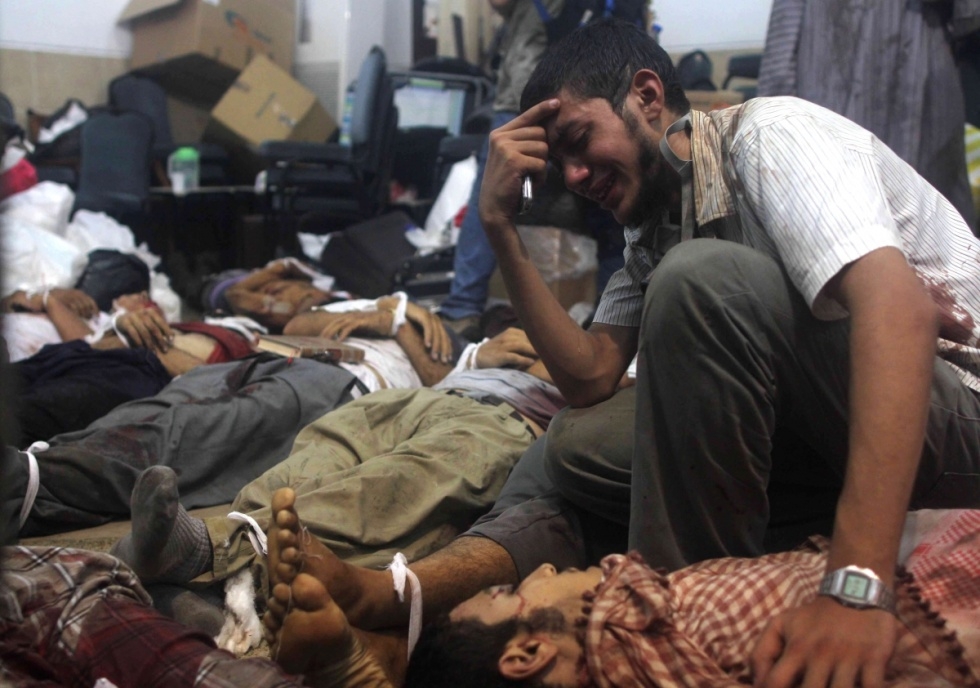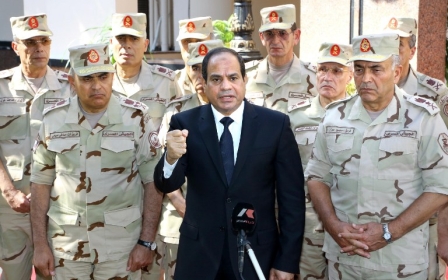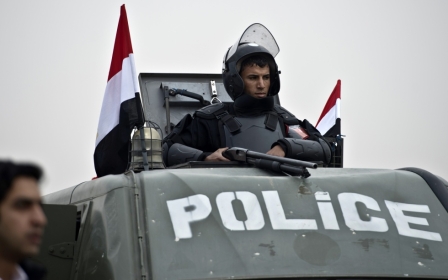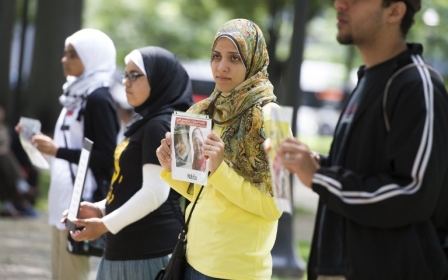Egypt: Timeline of key human rights violations since the 2011 revolution

The UN Human Rights Council met on Wednesday to review Egypt's human rights record, since their last Universal Periodic Review over four years ago.
Since the last review, Egypt has seen a revolution depose longtime leader Hosni Mubarak, experienced a popularly-backed military coup that unseated the country's first freely elected president, and voted in former army chief Abdel-Fattah al-Sisi as the current head of state.
Amid the mass protests, huge crackdowns, and widespread unrest, large numbers have been killed, tens of thousands imprisoned and hundreds given the death sentence.
Human rights groups have documented large-scale abuses. Here is a timeline of key events since the January 2011 revolution:
Military rule
2011
25 February: Force used by the military for the first time against protesters calling for the dismissal of Prime Minister Ahmed Shafiq – army issue an apology the following day for “unintended assaults by military police.”
9 March: Military police beat protesters and perform “virginity tests” on arrested women at a Tahrir Square demonstration calling for Shafiq’s dismissal.
15 May: Police and army use rubber bullets and live ammunition against protesters near the Israeli Embassy in Giza.
9 October: 28 are killed and 212 injured, mostly Egyptian Copts, at a protest in response to the demolition of a church in Upper Egypt – the army used live ammunition and its armoured vehicles ran over protesters.
19 November: At least 90 protesters are killed and tens of thousands injured in five days of clashes with police backed by the army.
16 December: 15 killed and at least 900 injured when a protest against Kamal el-Ganzoury’s appointment as prime minister results in seven days of clashes with the army.
29 December: Five international NGOs are shut down – along with several Egyptian rights groups – and accused of receiving donations from a foreign government without a license.
Presidency of Mohammed Morsi
2012
21 November: A number of protesters are killed by police or Muslim Brotherhood militants after a demonstration calling for the Interior Ministry to be restructured.
22 November: Morsi makes a constitutional declaration barring the judiciary from contesting his decisions and dismisses Egypt’s prosecutor general, replacing him with a political ally.
29 November: Muslim Brotherhood parliamentarians pass controversial draft constitution limiting rights to freedom of belief and expression while omitting protection of women’s rights – this comes after liberal, secular and Christian members withdraw from the Constituent Assembly.
5 December: Armed Muslim Brotherhood supporters attack 300 anti-government protesters at a sit-in near the presidential palace – numerous protesters are tied to the palace’s gates and beaten by Brotherhood supporters.
2013
23 March: Journalists and opposition politicians are assaulted by pro-Morsi protesters during a sit-in at Media City, where independent television channels have studios.
7 April: A Coptic cathedral is attacked by mobs following sectarian violence in El-Khosous, near Cairo – Morsi condemns the attack but does not order an official investigation.
8 May: Shura Council provisionally approves legislation restricting the right to protest – requiring demonstrators to submit requests to police three days in advance, which can be rejected without reasons being disclosed.
4 June: 43 international and Egyptian NGO employees are convicted of running unlicensed organisations and receiving foreign donations illegally – they are sentenced to between one and five years in prison.
7 June: Pro-Morsi activists set ablaze the headquarters of Tamarod – a ‘rebel’ group that took orders from the army – after weeks of violence against the movement.
24 June: Four Shiite villagers are killed in a mob attack, after delegates at a conference, with Morsi in attendance, are said to have incited hatred against Egypt’s Shiite community.
30 June: Eight people are killed outside the Muslim Brotherhood headquarters in Cairo, amid large demonstrations calling for Morsi to step down – three days later he is ousted in a popularly backed military coup.
Military rule
5 July: Ministry of Health announce political violence since 28 June has killed 52 and injured more than 2,619, as swathes of Muslim Brotherhood leaders, including Morsi, and their supporters are arrested.
8 July: At least 51 people are killed outside the Republican Guard headquarters in Cairo – Human Rights Watch and Amnesty International call for urgent investigations into military and police – as protests continue against the coup.
22 July: Human Rights Watch release a report calling on authorities to look into several attacks against Egypt’s Christian community, to determine whether police could have stopped the violence.
27 July: At least 74 pro-Morsi supporters are killed in clashes with Egypt’s riot police on a road near the sit-in at Rabaa al-Adawiya in east Cairo.
14 August: At least 817 people are killed when security forces move to clear the anti-coup sit-in at Rabaa al-Adawiya in Cairo, with the death toll rising above 1,150 after more protestors are killed at other sit-ins across the country.
22 August: Authorities are urged to protect Egypt’s Christian community after scores of churches are burnt and looted across the country, leaving at least four dead since 14 August.
26 November: Police use water cannon to disperse several hundred protestors in Cairo, two days after Interim President Adly Mansour issues a new law severely restricting the right to protest – the crowds chant slogans against civilians being tried in military courts.
2014
16 February: Four civilians are killed when a bomb targets a busload of tourists in the Sinai Peninsula, which is later claimed by militant group Ansar Bait al-Maqdis (Partisans of Jerusalem).
22 March: 529 people are sentenced to death by a court in Minya, after a swift trial in which the many of the defendants’ are tried in absentia – human rights strongly condemn the ruling.
28 April: 683 people – including Muslim Brotherhood Supreme Guide Mohammed al-Badie – are recommended for the death sentence by the same court in Minya. The judge also confirms 37 of the 529 death sentences handed out in March.
25 May: Independent reporting group Wikithawra releases a report detailing 41,163 people arrested and prosecuted since July 2013, with 89 percent of cases related to political participation – the report comes just one day before a controversial election sees army chief Abdel-Fattah al-Sisi crowned as the new president.
Presidency of Abdel-Fattah al-Sisi
11 June: 25 protesters – including popular activist Alaa Abdel Fattah – are sentenced to 15 years in prison and fined LE 100,000 ($14,000) on charges relating to their participation in demonstrations on 26 November 2013.
13 June: Authorities are urged to act against a rising tide of sexual assaults and harassment against women in Egypt, after rights groups document at least nine incidents of mob assaults and harassment in Cairo’s Tahrir Square between 3 and 8 June.
21 June: A court in Minya confirms 183 of the 683 provisional death sentences given to defendants in an earlier widely condemned trial – 496 are acquitted while 3 are given life sentences and one other 15 years.
23 June: Three Al Jazeera English staff are sentenced multi-year prison sentences, after a trial in which Human Rights Watch said “prosecutors failed to present any credible evidence of criminal wrongdoing”.
26 June: Ministry of Social Solidarity present draft legislation making all activities of independent associations subject to government veto.
12 August: Human Rights Watch release watershed report saying the killings at Rabaa were “likely crimes against humanity” and said the incident was “one of the world’s largest killings of demonstrators in a single day in recent history”.
6 September: Authorities are urged to release seven men detained for alleged “homosexual conduct”, after an online video was published showing the men attending what appeared to be a same-sex marriage – they are later convicted and sentenced to three years in prison.
14 October: Over 110 university students are held by authorities, after the new academic year began with waves of protest on 11 October. New rules brought in severely restrict the right to free expression and association on campuses across the country.
5 November: The UN Human Rights Council holds their first review of Egypt’s human rights record since the ouster of Morsi.
Sources: Freedom House, Human Rights Watch, Amnesty International
Middle East Eye propose une couverture et une analyse indépendantes et incomparables du Moyen-Orient, de l’Afrique du Nord et d’autres régions du monde. Pour en savoir plus sur la reprise de ce contenu et les frais qui s’appliquent, veuillez remplir ce formulaire [en anglais]. Pour en savoir plus sur MEE, cliquez ici [en anglais].




